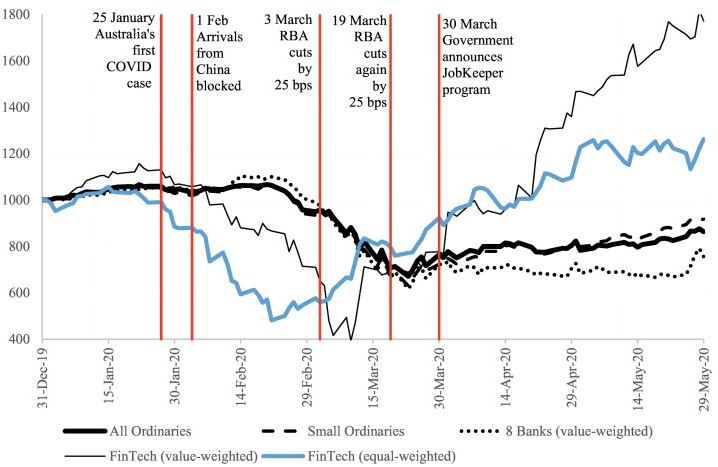
Australia’s major banking and fintech sectors were buoyed by early government macroeconomic responses to the challenges posed by COVID-19, new research shows.
Flinders University and Griffith University finance experts have looked back at the economic lessons learned during the first year of the country’s response to COVID-19 pandemic and found that immediate measures taken by the Federal Government and Reserve Bank of Australia in early-to-mid 2020 had a stabilising effect on the domestic banking and capital market sectors.
“The policy responses to the pandemic are an important opportunity to evaluate Australia’s economic response to a crisis caused by factors outside of the country’s control,” says Dr Jak Kakhkharov, from Flinders University’s College of Business, Government and Law.
“The response of fintech stocks was more sensitive and, in many cases, contrasting to changes in government emergency measures, COVID-19 news and monetary policy-related announcements, compared to banks.
“Results in this study support a strong emphasis on macroeconomic policy moves as the best stabilising policy tool when managing the banking sector and capital market in times of such crises in Australia.”
The study examined the impact of news that related to COVID-19, monetary policy interventions, containment measures and the unwinding of restrictions on Australian bank and fintech stock prices.
Overall, bank and fintech stock prices were more affected by the government’s macroeconomic announcements and unwinding of containment measures than to monetary policy interventions at the early stages of the crisis.

While banks and fintech stocks were included in a sharp fall in the All Ordinaries Index in March 2020, fintech stocks also experienced sharper declines in February and March 2020 before staging a remarkable recovery from these lows (see graph, above).
Monetary policy interventions resulted in lower bank and fintech stock prices in the first stage of the COVID-19 pandemic.
The share prices of smaller, often more volatile fintech stocks – operating in cybersecurity, mobile transactions, data analytics, blockchain, peer-to-peer business, robo-advertising and Internet of Things (IoT) sectors – reacted differently to the crisis, proving more sensitive to the rapid series of monetary interventions.
Banks play a central role in the Australian financial system, holding almost 60% of financial institutions’ assets.

“This study suggests a need for more emphasis on macroeconomic policy interventions in Australia to stabilise this stock sector when managing future crises caused by outside factors,” researchers conclude.
Macroeconomic measures used included closure of non-essential businesses, Australian government guarantee of SME loans, JobKeeper Payment program, other assistance/restrictions on businesses.
Monetary policy interventions include the cash rate adjustments, decisions to leave the cash rate unchanged, quantitative easing program and a term funding facility for the banking system, with particular support for credit to small and medium-sized businesses.
Researchers suggest further analysis of the long-term effects of policy responses introduced since 2020 to better manage future responses, including the pros and cons of government income support measures and further restrictions imposed to contain the spread of the virus, and the economic efforts to keep major equity sectors on track for investors and economic stability.
“The pandemic engulfed all economies and triggered complementary response from federal governments and monetary authorities, from economic restrictions and easing, temporary closure of businesses, quantitative easing and interest rate cuts and fiscal backstops,” says Dr Kakhkharov.
“The policy responses of governments and central banks around the world to the financial market turbulence caused by the pandemic continue to support economies and markets in the months – and possibly years – to come.”
The article – COVID-19 and policy responses: Early evidence in banks and FinTech stocks (2022) by Jakhongir Kakhkharova and Robert J Bianchi – has been published in the Pacific-Basin Finance Journal (Elsevier) DOI: 10.1016/j.pacfin.2022.101815.

